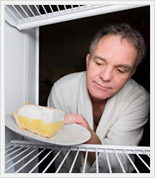 |
Already a member? Secure Login
|

- Ideal Weight Calculator
- Waist-to-Hip Ratio Calculator
- BMI Calculator
- Frame Size Calculator
- Target Heart Rate Calculator

- Good Fast Food
- Recipe Makeovers
- Meal Plans
- Nutrient Facts
- Food Label Claims
- Estimating Serving Sizes



Nighttime Snacking: Habit or Hunger
QUESTION:
I'm trying to break the habit of snacking at night after dinner. Do you have any suggestions or tips?
I'm trying to break the habit of snacking at night after dinner. Do you have any suggestions or tips?
ANSWER:
 Nighttime snacking can be problematic and there are steps that you can take to break this habit. However, it is important to first determine whether or not you are snacking out of habit or hunger. For instance, if you eat an early dinner at 5:30 or 6 pm and are a night owl who likes to stay up until midnight, then you are probably experiencing true hunger around 9:30 or 10 pm. Listen to your body and feed it when it's hungry. Choose healthy snacks that are just filling enough to take the hunger away. A low-fat yogurt or a cup of hot tea with toast and nut spread will usually do the trick.
Nighttime snacking can be problematic and there are steps that you can take to break this habit. However, it is important to first determine whether or not you are snacking out of habit or hunger. For instance, if you eat an early dinner at 5:30 or 6 pm and are a night owl who likes to stay up until midnight, then you are probably experiencing true hunger around 9:30 or 10 pm. Listen to your body and feed it when it's hungry. Choose healthy snacks that are just filling enough to take the hunger away. A low-fat yogurt or a cup of hot tea with toast and nut spread will usually do the trick.However, if you finish dinner and are plopping down in front of the TV an hour later with a bag of chips, then you are probably snacking out of habit. Although habits can be difficult to break, the good news is that you're not fighting physiological hunger. Therefore, you can set up some roadblocks to habitual snacking that can break the cycle. Once you interrupt the cycle and develop a new routine, the problem is usually resolved.
Developing a new routine is crucial to your success. If you don't already, clean up the dinner dishes immediately following your meal. With a clean kitchen, you are less likely to dirty a dish for your snack. Once the kitchen is spic and span, turn off the kitchen lights and close the kitchen for the night. This is a bit harder to do physically these days since many kitchens are open spaces joined to family rooms. If you don't have an actual door, you can tape a ribbon across the opening or put a chair in the middle of the walkway or in front of the refrigerator or food pantry. Make a sign that says "Kitchen Open" on one side and "Kitchen Closed" on the other and hang it in a prominent place. Get creative with ideas that will remind you to "stop", thereby interrupting the habit.
Once the kitchen is closed, head to the bathroom and brush and floss your teeth. This age-old tip works very well as it signals that eating is done for the day. If you get the urge to snack a couple hours later (assuming it's not true hunger), you can always rinse again with mouthwash.
There are a few places that snacking frequently occurs. These are standing in the kitchen (either while cooking or simply raiding the cupboards), sitting in front of the TV or computer, reading or working at your desk, or driving in the car. Try to make every snack and meal a sit down affair. It's hard to listen to your internal body cues when you're multitasking. Form the new habit of always sitting down at the table while eating. Once this is your customary way of consuming food, mindless snacking elsewhere will feel foreign.
Lastly, you might need to shake up your nightly routine for awhile until the snacking habit is resolved. For example, if you simply can't resist your normal routine of watching TV with a bowl of popcorn, you may need to replace your TV watching for a few weeks with something different that is not associated with snacking. Pull out a jigsaw puzzle or something new and unique that you typically don't do.
Remember, the key is to live and eat more consciously. Take steps that enable this mindful approach and interrupt unconscious habits that aren't working for you. Good luck!
| Related Articles: |
 |
Our expert, Dr. Sharon E. Griffin, holds a B.S., M.S., and Ph.D. in the areas of exercise science/physiology. She also holds a second M.S. degree in Nutrition and is a licensed nutritionist and an ACSM certified health and fitness instructor.
© 2025 MyFoodDiary.com. All Rights Reserved.